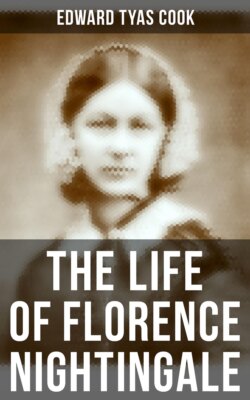Читать книгу The Life of Florence Nightingale - Edward Tyas Cook - Страница 55
На сайте Литреса книга снята с продажи.
VI
ОглавлениеThe work there did not fail within its appointed scope, but in another way the failure which Miss Nightingale had predicted in her letter to Madame Mohl soon became apparent. The scale of the undertaking was more restricted than Florence had desired, and she saw no means of widening it. She had wanted to receive patients of all classes, to enrol many volunteer nurses, to have opportunities for training them. Among a wide circle, both at home and abroad, her knowledge and her talents were well understood; and already, in her correspondence for a year or two past, she appears as a woman to whom reference was made as to one speaking with authority. A missionary in Paris applied to her for two well-qualified matrons. “Alas,” she had to reply, “I have no fish of that kind.” She was making the most of her present opportunity, but it was narrow. Some of her friends had thought from the first that she was wasting her powers on unsuitable soil in Harley Street. Monckton Milnes, who paid a visit to Embley in December 1853, wrote to his wife: “They talk quite easily about Florence, but her position does not seem very suitable. I wish we could put her at the head of a Juvenile Reformatory.”68 Her own primary object was to train nurses; and other friends—Mrs. Bracebridge among the number—advised her to leave Harley Street, since there she found no scope for so doing. King's College Hospital had just been rebuilt, and another friend, Miss Louisa Twining, opened negotiations in August 1854 for securing Miss Nightingale's appointment as Superintendent of Nurses there. Some of the medical men, who had been impressed at Harley Street with her rare combination of gifts, were most anxious that she should consent to take up such a post. Dr. William Bowman in particular strongly pressed her, and was confident that, if she agreed, he could get the appointment en train in the autumn. Miss Nightingale's mother and sister sought as strongly to dissuade her. The sister laid stress on Florence's “doubtful health.” The mother added objections on the score of the medical students. They both urged that, if she must do something of the kind, Great Ormond Street and work among children were more suitable and convenient. Florence herself was greatly drawn to King's College Hospital, and began devising plans, on the model of Kaiserswerth, for enrolling a staff of nurses among farmers' daughters.
But the immediate future hid in it another fate for Florence Nightingale. “Thy lot or portion in life,” said the Caliph Ali, “is seeking after thee; therefore be at rest from seeking after it.” So Miss Nightingale may have read in Emerson; and in homelier phrase her good Aunt Mai had said to her, “If you will but be ready for it, something is getting ready for you, and will be sure to turn up in time.” Which things Florence, I doubt not, laid up in her heart. When news began to arrive from the East, did she recall a prophecy which had been made about her by a friend long before the Crimean War was dreamt of? Lady Lovelace, the daughter of Lord Byron, the “Ada sole daughter of my home and heart,” had, before her death in 1852, written a poem in honour of her friend, Florence Nightingale. I have quoted some of it already. The piece ends with a presage:—
In future years, in distant climes
Should war's dread strife its victims claim,
Should pestilence, unchecked betimes,
Strike more than sword, than cannon maim,
He who then reads these truthful rhymes
Will trace her progress to undying fame.
